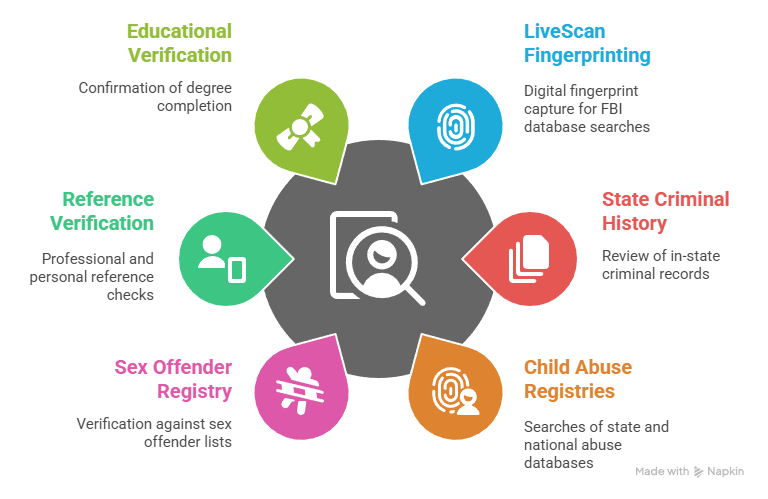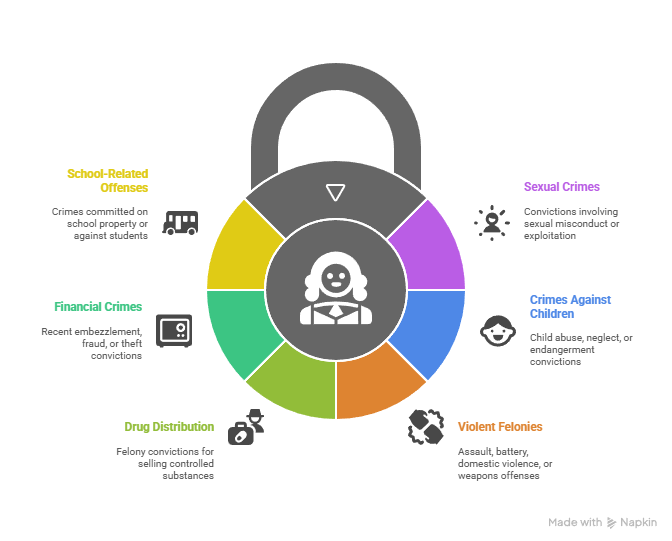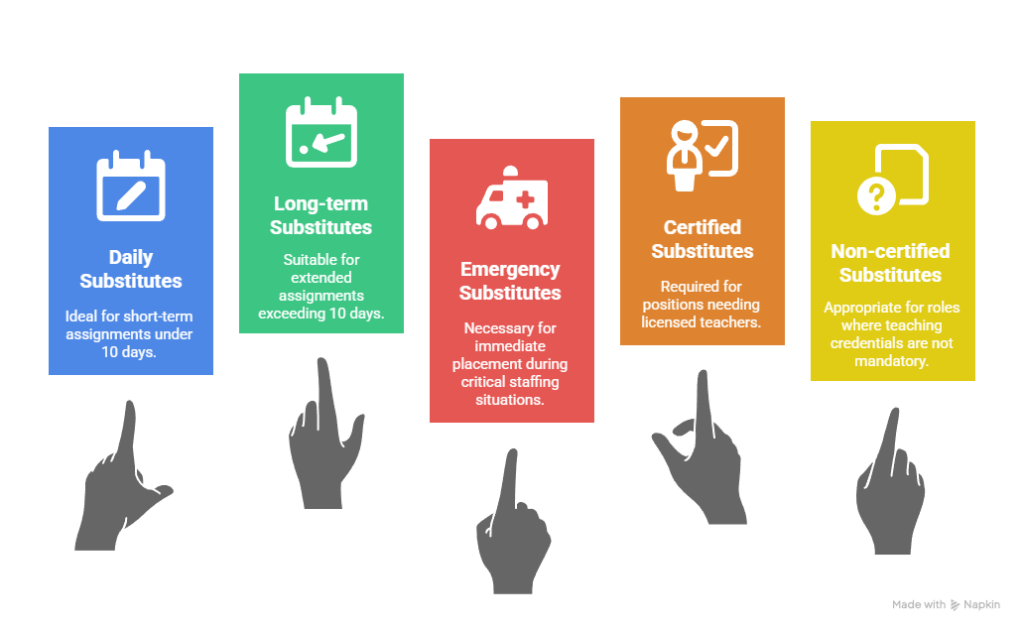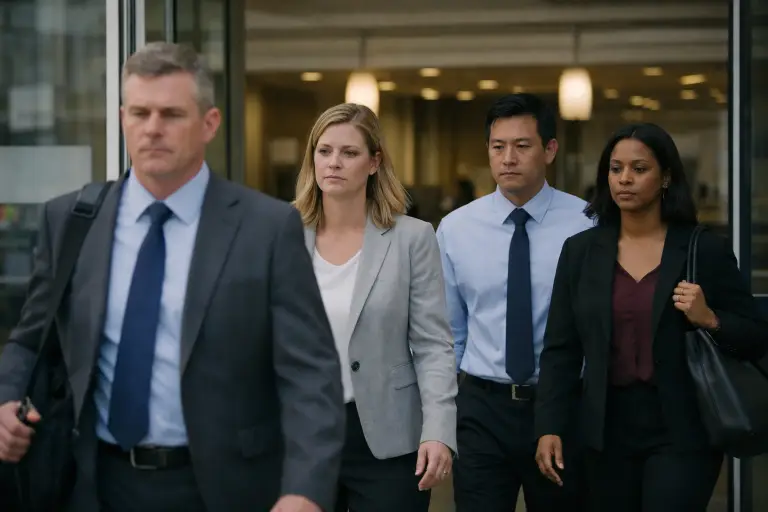Substitute teacher background check requirements vary significantly across states, with most requiring criminal history screenings, fingerprinting, and child abuse registry checks before classroom placement. Understanding these state-specific requirements is crucial for aspiring substitute educators and school districts to ensure compliance while expediting the hiring process.
Key Takeaways
- Federal baseline requirements: All states must comply with federal guidelines requiring background checks for school employees who have unsupervised access to students.
- Processing timeframes vary: Background check completion ranges from 3-10 business days in most states, with some requiring additional waiting periods.
- Fingerprinting is standard: Nearly all states require LiveScan fingerprinting or equivalent digital fingerprint submission for FBI and state criminal database searches.
- Child abuse registry checks: Most states mandate searches of state and national child abuse and neglect registries as part of the screening process.
- Reciprocity limitations: Background check clearances typically don't transfer between states, requiring new screenings when relocating.
- Ongoing monitoring: Many states implement continuous monitoring systems that alert districts to new criminal activity among cleared employees.
Federal Requirements for Substitute Teachers
The Every Student Succeeds Act (ESSA) establishes baseline requirements for all school personnel. This includes substitute teachers working in public schools. Federal law mandates comprehensive background screening for individuals with unsupervised access to students. These requirements apply uniformly across all 50 states. However, individual states may impose additional restrictions beyond federal minimums.
The federal framework requires searches of both FBI criminal databases and state repositories. Schools must also conduct reference checks and verify educational credentials. Districts receiving federal funding cannot employ substitutes with certain criminal convictions. Violent crimes, sexual offenses, and drug distribution felonies typically result in automatic disqualification.
The U.S. Department of Education oversees compliance with federal screening requirements. States that fail to meet standards risk losing federal education funding. Most states exceed federal minimums to ensure comprehensive safety screening. This creates variation in processing times and specific requirements across different jurisdictions.
State-by-State Background Check Requirements
Northeastern Region Standards
The northeastern region demonstrates some of the most stringent substitute teacher requirements nationwide. These states typically require comprehensive screening processes. Processing can take 2-3 weeks to complete in this region. Most northeastern states also require annual renewals or periodic re-screening for active substitutes.
Regional Requirements Include:

- LiveScan fingerprinting: Digital fingerprint capture for faster FBI database searches
- State criminal history: Comprehensive review of in-state criminal records
- Child abuse registries: Searches of state and national abuse databases
- Sex offender registry: Verification against state and federal sex offender lists
- Reference verification: Professional and personal reference checks
- Educational verification: Confirmation of degree completion and credentials
New York requires fingerprinting through the Office of Teaching Initiatives. The state conducts searches of criminal history and child abuse registries. Massachusetts uses the Criminal Offender Record Information (CORI) system. Connecticut requires Department of Children and Families registry checks.
Pennsylvania has one of the most comprehensive processes nationwide. The state requires three separate clearance certificates. These include state criminal history, child abuse history, and FBI fingerprint-based checks. All three must be current and valid for employment eligibility.
Southern States Approach
Southern states maintain robust background check requirements while focusing on processing efficiency. Many states address substitute teacher shortages through streamlined systems. Texas and Florida lead the region in processing speed through automated platforms. These states complete most background checks within 3-5 business days.
Georgia's Professional Standards Commission system provides real-time status updates. Applicants can track their background check progress online. Florida's Agency for Health Care Administration integrates multiple database searches. This creates a single application workflow for substitute teachers.
Several southern states have implemented regional reciprocity agreements. These allow some screening components to transfer between participating states. However, full background check transfers remain rare. Most candidates still need complete re-screening when moving between states.
Western States Variations
Western states show significant variation in substitute teacher background check requirements. California has some of the most comprehensive screening processes. The state requires multiple clearances and can take several weeks to complete. Arizona offers expedited processing for emergency substitute situations.
Nevada provides 24-hour emergency clearances for critical shortages. These temporary approvals require additional supervision until full screening completes. Colorado uses an integrated online system for application submission and tracking. Utah requires comprehensive screening but processes applications efficiently.
Western states often face unique challenges due to rural geography. Mobile fingerprinting services help reach remote areas. Some states partner with law enforcement agencies to expand fingerprinting access. This improves substitute teacher recruitment in underserved regions.
Processing Timeframes and Expedited Options
Standard processing timeframes vary significantly between states and systems. Most states complete initial screenings within 5-10 business days. However, peak hiring seasons create longer delays. August through September and January typically see increased processing times. Some states experience delays of 2-3 weeks during these periods.
Factors Affecting Processing Speed:
- Application volume: Higher volumes during peak hiring seasons slow processing
- System technology: Digital systems process faster than paper-based reviews
- Database integration: States with integrated systems complete searches faster
- Staffing levels: Adequate review staff reduces processing bottlenecks
- Complexity of records: Candidates with complex histories require additional review time
Several states offer expedited processing for critical situations. Emergency substitute teacher shortages qualify for faster review in many jurisdictions. Districts experiencing significant shortages can request priority processing. This typically reduces processing time to 24-48 hours.
Expedited processing often requires additional fees. These range from $25-75 above standard processing costs. Some states waive expedited fees during declared teacher shortage emergencies. Districts may cover these additional costs as recruitment incentives.
Emergency Clearance Procedures
Twenty-three states offer some form of emergency clearance for substitute teachers. These conditional approvals allow limited work while full background checks complete. Emergency clearances require direct supervision by cleared personnel. The supervising employee must maintain visual oversight of the emergency substitute.
Emergency clearances typically last 10-30 days depending on state regulations. Extensions may be available if background processing experiences delays. However, districts must document legitimate reasons for extended emergency employment. Abuse of emergency clearance systems can result in district penalties.
California's emergency substitute permits allow 30 days of supervised work. Texas provides conditional employment pending background completion. Florida offers emergency certifications for critical shortage areas. These systems help maintain classroom coverage during substitute shortages.
Comprehensive State-by-State Comparison
Major State Requirements Overview
Understanding specific requirements for major states helps substitute teachers plan their application process effectively. Each state maintains unique combinations of screening requirements and processing procedures. The following comparison highlights key differences in major hiring markets across the United States.
| State | Fingerprinting | Processing Time | Total Cost | Emergency Clearance | Renewal Period |
| California | LiveScan Required | 7-14 days | $95-125 | 30 days supervised | 5 years |
| Texas | LiveScan Required | 3-5 days | $55-75 | Available | 5 years |
| Florida | LiveScan Required | 5-7 days | $60-85 | Available | 3 years |
| New York | LiveScan Required | 7-14 days | $85-110 | Limited availability | 3 years |
| Pennsylvania | LiveScan Required | 10-14 days | $100-150 | Not available | 5 years |
| Illinois | LiveScan Required | 5-10 days | $70-95 | Available | 5 years |
| Ohio | LiveScan Required | 5-8 days | $50-70 | Available | 5 years |
| Georgia | LiveScan Required | 3-7 days | $45-65 | Available | 5 years |
| North Carolina | LiveScan Required | 5-10 days | $55-80 | Available | 5 years |
| Michigan | LiveScan Required | 7-12 days | $65-90 | Limited availability | 3 years |
| Arizona | LiveScan Required | 3-5 days | $40-60 | 24-hour emergency | 6 years |
| Washington | LiveScan Required | 5-10 days | $70-95 | Available | 5 years |
This comparison demonstrates the significant variation in requirements and costs across major states. Texas and Arizona offer the fastest processing times for standard applications. Pennsylvania and New York typically require the longest processing periods due to comprehensive screening requirements.
Fingerprinting Requirements and Technology
LiveScan Digital Systems
Most states have transitioned to LiveScan digital fingerprinting technology. This system captures high-resolution digital fingerprint images. LiveScan integrates directly with FBI and state criminal databases. The technology provides faster and more accurate results than traditional methods.
LiveScan appointments are available at various locations throughout most states. Police stations commonly offer fingerprinting services. Dedicated fingerprinting facilities provide specialized services. Some school districts maintain on-site LiveScan equipment for employee processing.
LiveScan Advantages:
- Speed: Results typically available within 24-48 hours
- Accuracy: Digital capture reduces errors and rejection rates
- Integration: Direct database connectivity eliminates manual processing
- Quality: High-resolution images improve matching accuracy
- Tracking: Digital systems provide real-time status updates
Costs for LiveScan services range from $25-75 depending on location. Urban areas typically offer more competitive pricing. Rural areas may have limited options and higher costs. Some states regulate LiveScan pricing to ensure reasonable access.
Traditional Fingerprinting Methods
Some rural areas still rely on traditional ink-and-roll fingerprinting methods. Equipment availability limits LiveScan access in remote locations. Traditional fingerprinting requires physical card submission to processing centers. This adds 3-5 business days to overall processing time.
Traditional fingerprinting has higher rejection rates due to quality issues. Poor print quality requires re-submission and additional delays. Weather and storage conditions can affect card quality during transport. Many states are phasing out traditional methods in favor of digital systems.
Mobile fingerprinting services bridge the gap in underserved areas. These services bring LiveScan equipment to remote locations. Mobile units visit school districts and community centers on scheduled routes. Premium pricing typically applies for mobile services.
Disqualifying Factors and Criminal History Review
Criminal convictions don't automatically disqualify all substitute teacher candidates. Most states evaluate offenses through case-by-case review processes. However, certain categories of crimes typically result in permanent disqualification. Understanding these factors helps candidates assess eligibility before applying.
Typically Disqualifying Offenses:

- Sexual crimes: Any conviction involving sexual misconduct or exploitation
- Crimes against children: Child abuse, neglect, or endangerment convictions
- Violent felonies: Assault, battery, domestic violence, or weapons offenses
- Drug distribution: Felony convictions for selling controlled substances
- Financial crimes: Recent embezzlement, fraud, or theft convictions
- School-related offenses: Crimes committed on school property or against students
The severity and recency of offenses significantly impact eligibility decisions. Recent convictions receive greater scrutiny than older offenses. Violent crimes and crimes against children rarely qualify for exceptions. Non-violent, older offenses may qualify for individual consideration.
Appeal and Waiver Processes
Most states provide formal appeal processes for denied background check applications. These administrative procedures allow candidates to present rehabilitation evidence. Appeal hearings typically occur before state education agency panels. Success rates vary significantly based on offense type and circumstances.
Appeal Process Elements:
- Written petition: Detailed explanation of circumstances and rehabilitation efforts
- Supporting documentation: Evidence of rehabilitation, treatment completion, character references
- Hearing opportunity: Chance to present case before review panel
- Legal representation: Right to attorney representation during proceedings
- Review timeline: Defined timeframes for appeal processing and decisions
Character references from community leaders strengthen appeal cases. Evidence of treatment completion for substance abuse issues helps. Educational achievements since conviction demonstrate rehabilitation efforts. Stable employment history shows responsible behavior patterns.
Some states offer limited waivers for specific shortage areas. Rural districts with severe substitute shortages may qualify for exceptions. These waivers typically include additional supervision requirements. Candidates must agree to enhanced monitoring and reporting conditions.
Interstate Reciprocity and Credential Transfer
Background check clearances typically don't transfer between states. Varying screening standards create legal barriers to reciprocity. Substitute teachers relocating must complete new background check processes. This requirement applies even for recent clearances from other states.
The National Association of State Directors of Teacher Education and Certification (NASDTEC) maintains interstate agreements. These primarily address teaching credentials rather than background screening requirements. Some elements of the process may be expedited through NASDTEC participation. However, criminal background checks must still be completed for each state.
Limited Reciprocity Examples:
- Regional compacts: Multi-state agreements for expedited processing
- Federal clearance recognition: Acceptance of existing federal background checks
- Military spouse provisions: Expedited processing for military families relocating
- Emergency agreements: Temporary recognition during critical shortages
Military families receive special consideration in many states. The Interstate Compact on Educational Opportunity for Military Children provides some benefits. Spouses of active duty military may qualify for expedited processing. However, full background screening requirements typically still apply.
Credential Recognition Programs
Some states participate in credential recognition programs that streamline certain processes. The Interstate Teacher Mobility Compact facilitates movement between participating states. This compact focuses on teaching licenses rather than background checks. However, it may expedite overall certification processes.
Teacher shortage areas sometimes receive special consideration for interstate transfers. States with critical substitute needs may expedite certain screening components. These arrangements typically involve formal agreements between state education agencies. Individual districts cannot create their own reciprocity arrangements.
Regional partnerships help address workforce mobility challenges. The Western Interstate Commission for Higher Education facilitates some interstate agreements. Southern Regional Education Board provides coordination for southeastern states. These organizations work to reduce barriers while maintaining safety standards.
Cost Analysis and Payment Structures
Background check costs create financial barriers for some substitute teacher candidates. Total expenses typically range from $50-150 per person. These costs include multiple components required for comprehensive screening. Understanding cost structures helps candidates budget appropriately for the process.
Typical Cost Components:
- Fingerprinting fees: $25-75 for LiveScan or traditional processing
- State criminal check: $15-45 for comprehensive database searches
- Federal FBI check: $18 standard federal processing fee
- Additional screenings: $10-30 for specialized registry searches
- Processing fees: $10-25 for administrative handling
- Expedited options: $25-75 additional for faster processing
Geographic location significantly affects total costs. Urban areas typically offer more competitive pricing options. Rural areas may have limited providers and higher fees. Transportation costs to fingerprinting locations add expenses for rural candidates.
District Payment Policies
Some school districts cover background check costs as recruitment incentives. This practice is becoming more common during substitute teacher shortages. Districts may reimburse candidates after successful completion of screening processes. Others pay providers directly to eliminate upfront candidate costs.
California's Assembly Bill 1012 requires districts to reimburse substitute teachers for certain expenses. This includes background check and credentialing costs. Other states are considering similar legislation to address recruitment barriers. These policies recognize that upfront costs discourage qualified candidates.
Payment assistance programs exist in some regions. Non-profit organizations sometimes sponsor background checks for low-income candidates. Community foundations may provide grants for education-related expenses. These programs help ensure financial barriers don't prevent qualified individuals from substitute teaching.
Technology Integration and Digital Transformation
Modern background check systems leverage advanced technology for improved efficiency. Cloud-based platforms integrate multiple database searches into streamlined workflows. Artificial intelligence helps identify potential matches and flag inconsistencies requiring review. These technological improvements reduce processing delays and improve accuracy.
Digital Platform Features:
- Real-time tracking: Candidates monitor application progress through online portals
- Automated notifications: Email and text alerts for status updates
- Mobile compatibility: Smartphone-friendly applications and document upload
- Integrated databases: Single search across multiple criminal justice systems
- Secure storage: Encrypted data storage and transmission protocols
Texas Education Agency's State Board for Educator Certification exemplifies modern technology integration. The system provides comprehensive online application processing. Real-time status updates keep candidates informed throughout the process. Automated communications reduce administrative burden on staff.
Emerging Technologies
Blockchain technology shows promise for secure credential verification. This technology could create tamper-proof records of background check completions. Interstate sharing of verified credentials becomes more feasible with blockchain systems. However, widespread adoption remains several years away.
Biometric identification systems are expanding beyond traditional fingerprinting. Some states are exploring facial recognition and other biometric markers. These systems could provide additional security and verification capabilities. Privacy concerns and legal frameworks need resolution before widespread implementation.
Artificial intelligence improves matching accuracy and processing speed. Machine learning algorithms identify potential matches more efficiently than manual review. Natural language processing helps analyze complex criminal records. These technologies reduce false positives and improve overall system reliability.
Special Circumstances and Exceptions
Emergency Shortage Provisions
States facing critical substitute teacher shortages may implement emergency provisions. These allow temporary relaxation of certain requirements during declared emergencies. COVID-19 demonstrated the need for flexible policies during crisis situations. Many states developed emergency procedures that remain in place today.
Emergency provisions typically maintain core safety requirements while streamlining processes. Fingerprinting and criminal history checks remain mandatory. However, processing timelines may be accelerated. Additional supervision requirements often accompany emergency authorizations.
Districts must document legitimate emergency circumstances to use these provisions. Student safety cannot be compromised for administrative convenience. State education agencies monitor emergency provision usage to prevent abuse. Regular reporting requirements ensure appropriate utilization of emergency procedures.
Substitute Categories and Requirements
Different types of substitute positions may have varying background check requirements. Long-term substitutes often face more stringent screening than daily substitutes. Some states distinguish between certified and non-certified substitute teachers. These distinctions affect both requirements and processing procedures.
Common Substitute Categories:

- Daily substitutes: Short-term assignments typically under 10 consecutive days
- Long-term substitutes: Extended assignments exceeding 10 consecutive days
- Emergency substitutes: Immediate placement during critical staffing situations
- Certified substitutes: Licensed teachers working in substitute capacity
- Non-certified substitutes: Qualified individuals without teaching credentials
Certified teachers working as substitutes may have streamlined background check processes. Their existing credentials often include current criminal history clearances. However, additional district-specific requirements may still apply. Non-certified substitutes typically complete full screening processes.
Compliance Monitoring and Ongoing Requirements
Most states require periodic renewal of background check clearances for active substitute teachers. Renewal periods typically range from 3-5 years depending on state regulations. Some states implement continuous monitoring systems that provide real-time alerts for new criminal activity. These systems help ensure ongoing compliance with safety standards.
Continuous monitoring systems scan criminal databases regularly for new arrests or convictions. Participating states receive automatic notifications when cleared employees face new charges. This allows for immediate review and potential suspension pending case resolution. The technology significantly improves student safety through proactive monitoring.
Ongoing Compliance Elements:
- Renewal screenings: Periodic re-screening every 3-5 years
- Continuous monitoring: Real-time alerts for new criminal activity
- Self-reporting requirements: Obligation to report new arrests or charges
- Training updates: Required training on safety policies and procedures
- Database maintenance: Regular updates to ensure accurate information
Self-reporting requirements place responsibility on substitute teachers to disclose new legal issues. This includes arrests, charges, or convictions that occur after initial clearance. Failure to report can result in permanent disqualification from educational employment. Clear communication of these requirements helps ensure compliance.
Conclusion
Substitute teacher background check requirements reflect each state's commitment to student safety while addressing workforce needs. Processing times, costs, and specific requirements vary significantly across jurisdictions. Understanding state-specific requirements enables candidates to navigate screening processes efficiently. Technology improvements continue enhancing system speed and accuracy while maintaining rigorous safety standards. As teacher shortages persist, states balance comprehensive screening with practical recruitment needs to ensure classroom coverage.
Frequently Asked Questions
How long do substitute teacher background checks typically take?
Most states complete substitute teacher background checks within 5-10 business days, though processing times can extend to 2-3 weeks during peak hiring seasons. States with fully digital systems like Texas and Florida often process applications faster than those relying on manual review processes.
Can I use my background check from another state?
Generally, substitute teacher background checks don't transfer between states due to varying screening standards and legal requirements. You'll typically need to complete a new background check when moving to a different state, even if your previous clearance is recent.
What crimes disqualify someone from substitute teaching?
Sexual offenses, violent felonies, drug distribution charges, and child abuse convictions typically result in permanent disqualification. However, many states evaluate cases individually, and minor or older offenses may not automatically disqualify candidates.
Who pays for substitute teacher background checks?
Payment responsibility varies by district and state. Some school districts cover background check costs as recruitment incentives, while others require candidates to pay upfront fees ranging from $50-150. Military spouses and emergency hires may qualify for fee waivers in certain states.
How often do substitute teachers need to renew background checks?
Most states require background check renewals every 3-5 years, though some implement continuous monitoring systems that alert districts to new criminal activity. Emergency substitutes or long-term placements may need additional screening depending on assignment duration.
Can I work as a substitute teacher while my background check is pending?
Some states allow conditional employment with direct supervision while background checks are processed, but this varies significantly by location. Emergency clearances for critical shortages are available in about half of all states, typically requiring additional oversight until full screening completes.
Additional Resources
- National Association of State Directors of Teacher Education and Certification (NASDTEC) - Interstate Agreement Information
https://www.nasdtec.net/page/Interstate - U.S. Department of Education - Background Check Requirements for School Personnel
https://www.ed.gov/policy/elsec/leg/essa/ - FBI Criminal Justice Information Services - Background Check Guidelines
https://www.fbi.gov/services/cjis - Education Week - State-by-State Teacher Certification Requirements
https://www.edweek.org/policy-politics/ - Substitute Teaching Institute - State Certification Resources
https://www.subed.usu.edu/ - Council of Chief State School Officers - Educator Background Check Standards
https://www.ccsso.org/

GCheck Editorial Team
Meet the GCheck Editorial Team, your trusted source for insightful and up-to-date information in the world of employment background checks. Committed to delivering the latest trends, best practices, and industry insights, our team is dedicated to keeping you informed.
With a passion for ensuring accuracy, compliance, and efficiency in background screening, we are your go-to experts in the field. Stay tuned for our comprehensive articles, guides, and analysis, designed to empower businesses and individuals with the knowledge they need to make informed decisions.
At GCheck, we're here to guide you through the complexities of background checks, every step of the way.





